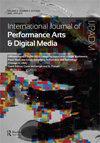A datalogical reading of online performance
IF 0.9
0 THEATER
International Journal of Performance Arts and Digital Media
Pub Date : 2021-12-26
DOI:10.1080/14794713.2021.2018222
引用次数: 1
Abstract
ABSTRACT This article offers a datalogical reading of online performance. In constructing the framework for this new mode of analysing online, computationally centred performance practice, it draws on discussions of data and the datalogical in Blackman [Blackman, L. 2019. Haunted Data: Affect, Transmedia, Weird Science. London: Bloomsbury Academic]; Clough et al [Clough, P. T., K. Gregory, B. Haber, and R. Scannell. 2015. “The Datalogical Turn.” In Non-representational Methodologies: Re-envisioning Research, edited by P. Vannini. London: Taylor & Francis Group] and Chun [Chun, W. 2016. Updating to Remain the Same: Habitual New Media. Cambridge, MA: The MIT Press], as well as the practices of surveillance capitalism outlined by Zuboff [The Age of Surveillance Capitalism: The Fight for the Future at the New Frontier of Power. London: Profile Books]. In conducting the analysis, attention is specifically paid to data as a ‘process of translation’ [Blackman, L. 2019. Haunted Data: Affect, Transmedia, Weird Science. London: Bloomsbury Academic], how the audience-participant as data-subject is identified and known and the ways in which data passes in and out of bodies in these works. In looping together these underlying computational happenings with the dramaturgical practices of the performances, I argue that a richer and expanded perspective of online performance practice is afforded – one which opens up the relationships between what we see, feel and experience and the other unseen, but present happenings centred in data exchange and processing within the events in question.在线表现的数据阅读
摘要本文提供了在线性能的数据逻辑解读。在构建这种在线分析、以计算为中心的性能实践的新模式的框架时,它借鉴了Blackman[Blackman,L.2019中对数据和数据逻辑的讨论。闹鬼的数据:情感,跨媒体,怪异的科学。伦敦:布鲁姆斯伯里学院];Clough等人[Claugh,P.T.,K.Gregory,B.Haber和R.Scannell.2015。“数据学转向”,《非代表性方法论:重新设想研究》,P.Vannini主编。伦敦:Taylor&Francis Group]和Chun【Chun,W.2016。更新以保持不变:习惯性新媒体。马萨诸塞州剑桥:麻省理工学院出版社],以及Zuboff概述的监视资本主义实践[监视资本主义时代:在新的权力前沿为未来而战。伦敦:简介书籍]。在进行分析时,特别关注作为“翻译过程”的数据[Blackman,L.2019。闹鬼的数据:情感,跨媒体,怪异的科学。伦敦:Bloomsbury Academic],如何识别和了解作为数据主体的受众参与者,以及在这些作品中数据进出身体的方式。通过将这些潜在的计算事件与表演的戏剧实践循环在一起,我认为在线表演实践提供了一个更丰富和扩展的视角——一个打开我们所看到、感受和体验与另一个看不见的之间关系的视角,但目前发生的事情集中在所讨论的事件中的数据交换和处理上。
本文章由计算机程序翻译,如有差异,请以英文原文为准。
求助全文
约1分钟内获得全文
求助全文
来源期刊

International Journal of Performance Arts and Digital Media
Arts and Humanities-Visual Arts and Performing Arts
CiteScore
1.70
自引率
0.00%
发文量
29
 求助内容:
求助内容: 应助结果提醒方式:
应助结果提醒方式:


